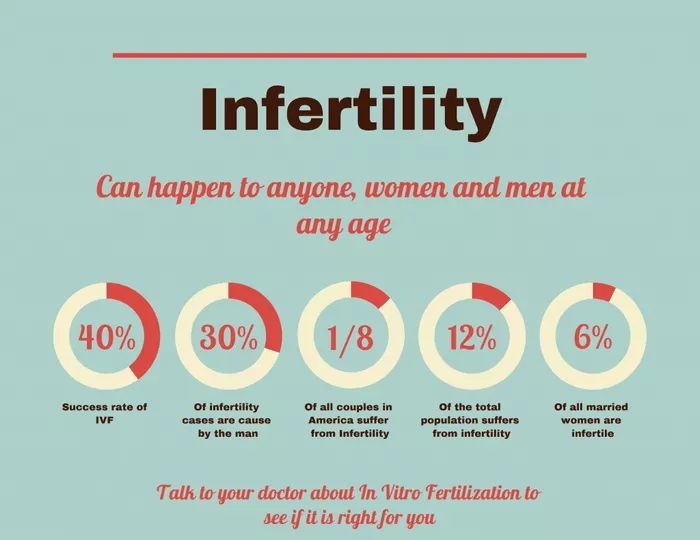Infertility is a deeply personal and often challenging journey for individuals and couples who are trying to conceive. The desire to have a child is a fundamental human experience, and facing obstacles on the road to parenthood can be emotionally taxing. One question that often arises is whether infertility can be cured. In this article, we’ll delve into this complex issue, exploring the various treatments and strategies available and shedding light on the possibilities for overcoming infertility.
Understanding Infertility: A Multifaceted Challenge
Before delving into the question of whether infertility can be cured, it’s important to understand what infertility is and what factors contribute to it. Infertility is defined as the inability to conceive after a year of regular, unprotected intercourse for individuals under 35, or after six months for those over 35. There are many potential causes of infertility, including hormonal imbalances, structural issues, genetic factors, age-related decline in fertility, and lifestyle factors. Identifying the underlying cause of infertility is crucial for determining the most appropriate treatment approach.
Treatment Options: Exploring the Possibilities
When it comes to treating infertility, there are several options available, ranging from lifestyle changes and medications to assisted reproductive technologies (ART) such as in vitro fertilization (IVF) and intrauterine insemination (IUI). Just as a doctor tailors a treatment plan to address a patient’s specific needs, fertility specialists work with individuals and couples to develop personalized treatment strategies based on their unique circumstances. The goal of treatment is not just to achieve pregnancy but to address the underlying causes of infertility and optimize reproductive health.
Lifestyle Changes: A Foundation for Fertility
For some individuals and couples, making lifestyle changes can improve fertility outcomes and increase the chances of conception. Just as maintaining a healthy lifestyle can improve overall health and well-being, adopting habits such as eating a balanced diet, exercising regularly, avoiding smoking and excessive alcohol consumption, and managing stress can positively impact fertility. Lifestyle changes may not “cure” infertility outright, but they can create a more supportive environment for conception and improve overall reproductive health.
Medications and Hormonal Therapy: Balancing the Body’s Chemistry
In cases where hormonal imbalances are contributing to infertility, medications and hormonal therapies may be prescribed to regulate ovulation and improve fertility. Just as a mechanic adjusts the components of a car engine to optimize performance, fertility medications such as Clomid or gonadotropins can stimulate ovulation and regulate menstrual cycles in women. Hormonal therapies may also be used to address hormonal imbalances in men, such as testosterone replacement therapy for low testosterone levels.
Assisted Reproductive Technologies (ART): Harnessing Scientific Advances
For individuals and couples facing more complex fertility challenges, assisted reproductive technologies (ART) offer advanced treatment options that can help overcome infertility. Just as a skilled craftsman uses specialized tools to create intricate designs, fertility specialists utilize ART procedures such as in vitro fertilization (IVF), intracytoplasmic sperm injection (ICSI), and embryo transfer to bypass or address specific fertility issues. These techniques can significantly increase the chances of conception for individuals and couples struggling with infertility.
Surgical Interventions: Addressing Structural Issues
In cases where structural abnormalities or disorders of the reproductive organs are contributing to infertility, surgical interventions may be necessary to correct the underlying issues. Just as a surgeon repairs a damaged structure to restore its function, procedures such as laparoscopic surgery to remove uterine fibroids or varicocelectomy to repair varicoceles in the scrotum can improve fertility outcomes and increase the chances of conception. Surgical interventions are often combined with other fertility treatments to optimize outcomes.
The Role of Hope and Resilience:
While infertility can be a challenging and sometimes overwhelming experience, it’s essential for individuals and couples to maintain hope and resilience as they navigate the journey to parenthood. Just as a sailor navigates stormy seas with determination and perseverance, facing infertility requires strength, courage, and a supportive community. While there is no guarantee that infertility can be “cured” in every case, there are many treatment options available that can help individuals and couples achieve their dream of parenthood.
[inline_related_posts title=”You Might Be Interested In” title_align=”left” style=”list” number=”6″ align=”none” ids=”1710,1716″ by=”categories” orderby=”rand” order=”DESC” hide_thumb=”no” thumb_right=”no” views=”no” date=”yes” grid_columns=”2″ post_type=”” tax=””]






















